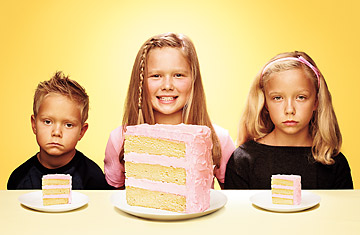
(5 of 5)
"I never got anywhere because you blew me so full of hot air, I could never stand taking orders from anybody!" he shouts.
"The door of your life is wide open!" Willy protests.
"Pop!" Biff answers. "I'm a dime a dozen, and so are you!"
Not all favored kids come to the grief the fictitious Biff did, of course. For most, the humbling that comes from moving into a world in which people judge more objectively can be an essential step to success. But whether favored kids learn the lesson well or not, it almost always awaits them. As family expert and author Judith Harris puts it, the first-among-equals status conferred in the home "doesn't travel well."
Favored sibs have other burdens to carry well before adulthood — among them a sense of guilt. It's hard not to feel pleasure at the preferential treatment that keeps coming at them from Mom and Dad, but it's hard not to feel sympathy for brothers and sisters who are denied it too. Lawrence Wynn, 20, a college student raised in Pacific Palisades, Calif., experienced such mixed feelings about his younger sister Emma, 17 (not their real names). Lawrence was their father's favorite, and he and Emma knew it. The disparate treatment got worse when their parents were divorcing and the stress of a fracturing family was expressed in their father's occasional outbursts of anger, often directed at Emma. Lawrence would come to her defense.
"I remember our dad would start yelling and my brother would try and steer his anger away from me," Emma says. "Then I felt guilty because [my father] would be screaming at my brother." It's a neat trick when a single parental act — openly preferring one child over another — can leave both kids with a guilt burden to carry.
But even the most blatant favoritism is easier to take when there's a defensible reason for it. Perhaps the most extreme example is when one child in the home has special needs. Children with Down syndrome or autism certainly require a particular kind of care and attention, including extra applause for skills learned. Kids with physical disabilities or challenges will require more time and attention from parents too, and that time and attention will necessarily be subtracted from the fixed amount they have to give their other kids. This is the human equivalent of the coot's instinct to protect the weakest — though amplified exponentially by our species' capacity for love. Still, even the most tolerant siblings will at some point begin to feel that, healthy or not, they deserve their full share of care. Talking about the situation openly is the best and most direct way to limit resentment. "Parents should give reasons the differential treatment is important," says Whiteman. "Research suggests that differential treatment may have no negative effects when children understand why."
Kids are also good at understanding that an older sibling will enjoy certain prerogatives that younger sibs don't get. What's more, the fact that the older sib does such trailblazing can mean looser rules for the younger ones. Parents may be beside themselves with worry the first time their firstborn gets behind the wheel. By the time the second or third kid is doing it, things are more relaxed. "What comes first is more salient," Whiteman says. "The age at which kids get privileges will look the same in terms of trajectory, but for second-borns, everything occurs earlier."
One of the best things about favoritism conflicts is that they usually fade as children grow older. Usually, of course, is not the same as always, and childhood resentments may never be entirely forgotten. Life issues such as which child becomes the caretaker of aged parents or who is bequeathed the most in a will can often become occasions to refight old wars and relitigate old grievances.
Still, in the best of circumstances, those battles can be fleeting. Even into middle age, my brothers and I — including Bruce — continue to try to coax our septuagenarian mother to concede that Bruce was her favorite son. Honoring the code of maternal omertà, she continues to deny it. Age, though, can make even the stoutest defenses slip, and one day she and I were recalling a long-ago school talent show that, like so many such shows when we were kids, starred Bruce. My mother beamed throughout the performance, and I glowered throughout it.
"Why were you so mad?" she asked. "Because he was my favorite?"
"Aha!" I cried.
"What?" she responded.
"You admitted it! He was your favorite!"
She looked at me innocently and blinked. "I have no idea what you're talking about," she said. It's her story — and she's sticking to it.
